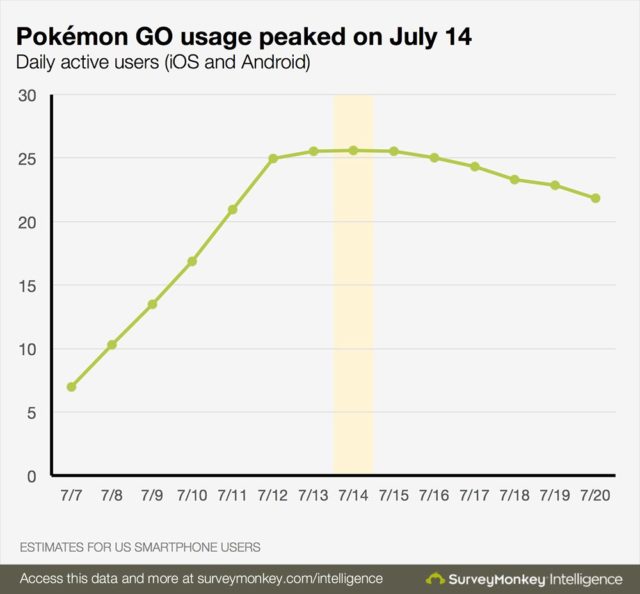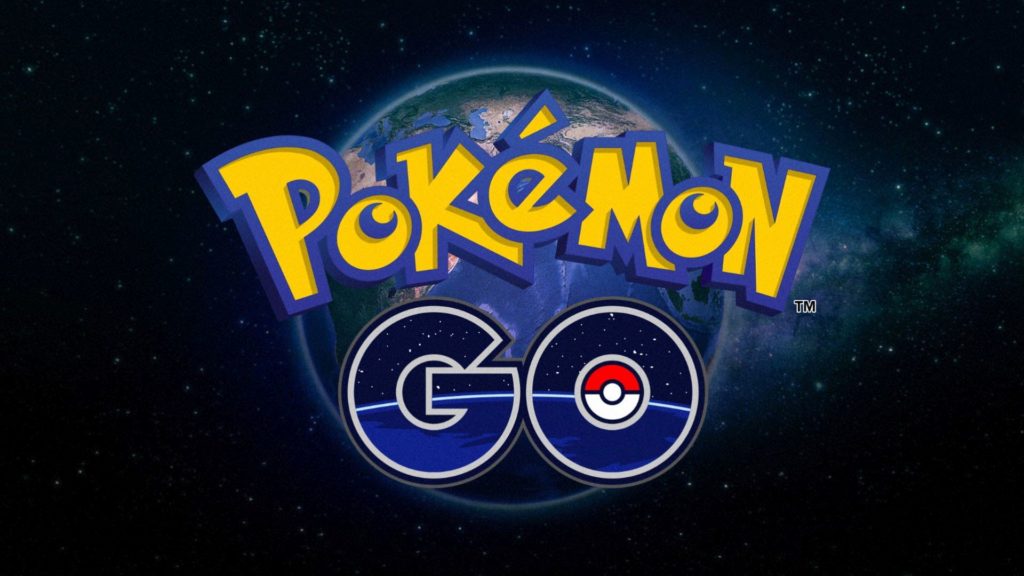The power of Pokémon GO continues to amaze, and now we have some numbers coming in to show just what the most popular mobile game in US history is doing. According to a recent report from SurveyMonkey, about 26 million people in the US have played the game on Android and iOS, making it a top 10 app for daily users, beating out Twitter. The phenomenon may have peaked in the US, as a separate SurveyMonkey’s report suggest, with the game’s largest day being July 14 (one week after release), but there hasn’t been much drop-off. “More people use the maps in Pokémon GO (which is powered by Google Maps) than use Google Maps itself,” according to SurveyMonkey.
There are a number of surprises with the Pokémon GO phenomenon. “What’s remarkable about the explosion of activity around Pokémon GO is how quickly it’s happened. Previous blockbuster titles Candy Crush and Draw Something took months to gain momentum, gather tens of millions of users, and hit peak usage. Pokémon GO achieved the same thing in a single week,” SurveyMonkey noted. The firm estimated Pokémon GO to have an average revenue per daily active user (ARPDAU) of around $0.25, which is twice the average for casual games and higher than Candy Crush Saga.

Pokémon GO is now up in over 30 countries, and today’s launch in Japan should help it continue to grow. The game has a promotional deal with McDonald’s of Japan to make all 3,000+ stores in Japan into gyms where players can battle. That’s in addition to Pokémon GO-themed toys being included with Happy Meals. That deal could be quite lucrative, and there’s no doubt that players in other countries will be clamoring for similar deals.
Here’s what industry leaders had to say about Pokémon GO at Casual Connect this week in San Francisco. The question [a]listdaily asked them was, “What lessons should we draw from Pokémon GO?”
“Pokémon GO is sort of the pop culture breakthrough,” said Chris DeWolfe, CEO of SGN Games. “You don’t see something hitting pop culture like that very often, on the internet, on social, in gaming… in anything. That one has. [Geoff Keighley] was saying earlier that he was in Battery Park in New York last week and a swarm of kids nearly overran him. I think what we can take away is that Ingress was fairly similar, and the Pokémon IP is one that stretches over multiple generations globally, and everyone knows what the Pokémon IP is.
“I think they created this social element to the game that made it more fun, but they made it more accessible to the average person. The average person wouldn’t play Ingress, even though it was a fun game, but the average person would play Pokémon because it’s Pokémon. They got the mapping part really right. One of the most interesting things was how they began to think about AR [augmented reality] versus everyone else. Everyone else was thinking about ‘how do I make this super-expensive complicated game on a HoloLens platform or a Magic Leap platform.’ And they said, ‘We don’t need to do that, we can do it much more simply.’ They utilized all the amazing psychology of AR on a device that everyone has. I think that was something they did that was really smart.”
What about a celebrity version of Pokémon GO? “You’re not the first person in the last week or two to make the suggestion—capture a Kardashian, ” laughed Glu Mobile CEO Niccolo de Masi, the company famous for Kim Kardashian: Hollywood and numerous other celebrity mobile games. “We’re going to think long and hard on it. Certainly the themes of AR and VR are in development; Glu put our Deer Hunter gamer on Oculus earlier this year, and it’s making some revenue but it hasn’t seen the inflection point of mass-market penetration of the hardware. I do think that AR will be in our thinking. By the way, prior to Pokémon, Ingress wasn’t a commercial success. I think there are themes that we’ll take into our games.”
The chief marketing officer of Unity, Clive Downie, sees the game as an affirmation of the category. “AR and VR are real, and when you do it right, you can see enormous adoption,” Downie said. “Pokémon Go is a true sign that AR and VR can power successful games, and mobile is going to be the platform that drives adoption of AR and VR.”
Tim Merel, CEO of Digi-Capital and VR game startup EyeTouch, saw brand as the most important lesson of Pokémon GO. “Having an awesome brand helps,” Merel said. “And having an awesome brand helps!” Merel also pointed out that keeping the core game loop very simple was a big plus. “Pokémon GO has helped with AR awareness in a huge way,” Merel said.
All in all the industry response gathered at Casual Connect was happiness, because the game has demonstrated three important things for mobile games. One is that it’s still possible for a small company to crack the top 10 of mobile games, when some have worried that the top games list has become very static. Granted, it took the immense power of the Pokémon IP to accomplish that, but there are other blockbuster IPs out there. Second is that this phenomenon happened with enormous speed, both in the viral uptake and in monetization—normally players don’t pay until they are into the game for weeks or even months, yet Pokémon GO are spending right away. Finally, Pokémon GO is seen as a clear endorsement of the power of AR to engage players, and by extension VR. That’s certainly a pleasant thought for all of the companies working on AR and VR titles.

